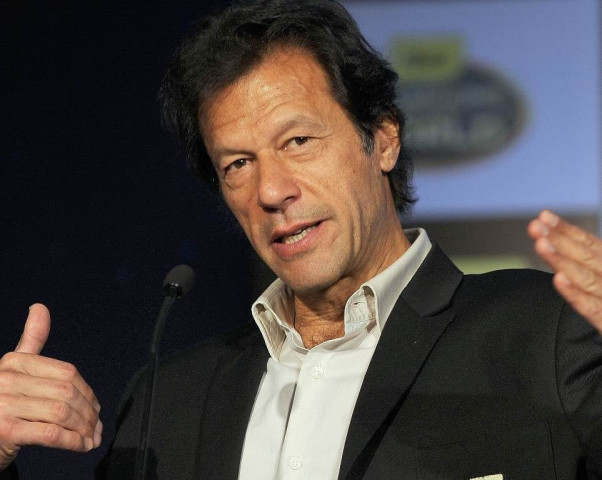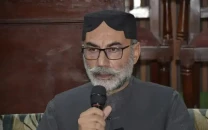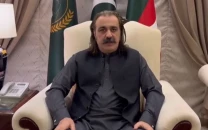With much interjecting, PTI unveils rural governance plan
Each village to have cattle, vegetable, grain market to end exploitative wholesaler-controlled market...

It is difficult not be overwhelmed by Imran Khan’s passion when he is talking in hyperbole about his oncoming “tsunami”. One felt even more overwhelmed when the Pakistan Tehreek-i-Insaf (PTI) chairman was interrupting from time to time with his characteristic capsule explanations of the points Jehangir Tareen was making while briefing senior journalists on the PTI’s proposed local government plan on Monday at a local hotel.
While deconstructing the highly complex initiative proposing empowerment of people at grassroots level, the cricketer-turned-politician kept referring to Akhtar Hamid Khan and his highly successful Orangi Pilot Project to make decentralisation sound like just a cinch.
At times he went back in history to the Moghul period to show how one can enable grassroots communities to self-govern with great success, while at others he would refer to what he understood to be a highly successful system of self governance being practiced by people living in the tribal areas.
The next minute he would refer to the most modern governance systems in Switzerland and the UK to show how his proposed idea would usher in real political reforms in the country.
He even referred to socialist China’s grassroots governance system as an ideal one to emulate. By the time Khan and Tareen finished -- the former with his interjections and the latter with his Powerpoint presentations---one felt as if one’s head had gone into topspin.
But seriously speaking, PTI’s proposal needs serious debate at the national level because it appears to be an earnest initiative aimed at improving governance.
The rural ‘tsunami’
The Rural Governance Vision proposes a village governance model envisaging an empowered village council comprising on average of seven or more councillors elected for four years, with reserved seats for women, elections on an open, free-list system, and the contestant obtaining the highest number of votes becoming the chairman.
Half the councillors, namely those who obtained the minimum votes, will retire after two years and be replaced by freshly elected ones.
Allocations include Rs500,000 per annum for each village from the public kitty to finance core functions for communal living, including chowkidars, village accountants, sanitation, emergencies and maintenance of public services.
Another Rs2 million per annum from the national exchequer would go to the average village for investment in infrastructure as per self determined priorities.
Each village will have its own cattle, vegetable and grain market to end the current exploitative government and wholesaler-controlled market regime. It is also proposed integrating overseas Pakistanis with the development of the villages of their origin.
Each village council will resolve disputes through negotiations, mediation and reconciliation backed by law. The village council chairman will serve as a Justice of Peace under the criminal procedure code, which will also enable him to summon the police for assistance.
Police station oversight committees will have one nominated councillor of each VC to be a member.
Each Village council will ensure maintenance of births, deaths and marriages, preventive healthcare, sewerage, solid waste management, water supply, and preventing encroachment. The VC will act as an intermediary to bring the formal banking services to the villages.
Published in The Express Tribune, April 11th, 2012.



















COMMENTS
Comments are moderated and generally will be posted if they are on-topic and not abusive.
For more information, please see our Comments FAQ